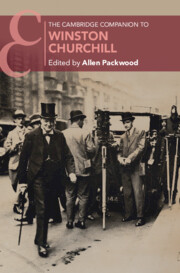Book contents
- The Cambridge Companion to Winston Churchill
- The Cambridge Companion to Winston Churchill
- Copyright page
- Contents
- Figures
- Contributors
- Foreword
- Acknowledgements
- Abbreviations
- Introduction
- 1 Churchill’s Contested History
- 2 The Inheritance of Winston Churchill
- 3 Learning Lessons
- 4 Churchill As a Writer and Orator
- 5 Churchill and Social Policy
- 6 Churchill, the ‘Irish Question’ and the Irish
- 7 Churchill’s First World War
- 8 Churchill, Art and Politics
- 9 Churchill’s Economics
- 10 Churchill, the Roosevelts and Empire
- 11 Churchill, India and Race
- 12 Churchill’s Campaign against Appeasement
- 13 Churchill As War Leader
- 14 Churchill, The English-Speaking Peoples and the ‘Special Relationship’
- 15 Churchill As International Statesman
- 16 Churchill and the Bombing Campaign
- 17 The Influence of Clementine Churchill
- 18 Churchill and the ‘United States of Europe’
- 19 Indian Summer or Conservative Winter?
- Conclusion
- Book part
- Index
- References
18 - Churchill and the ‘United States of Europe’
Published online by Cambridge University Press: 19 January 2023
- The Cambridge Companion to Winston Churchill
- The Cambridge Companion to Winston Churchill
- Copyright page
- Contents
- Figures
- Contributors
- Foreword
- Acknowledgements
- Abbreviations
- Introduction
- 1 Churchill’s Contested History
- 2 The Inheritance of Winston Churchill
- 3 Learning Lessons
- 4 Churchill As a Writer and Orator
- 5 Churchill and Social Policy
- 6 Churchill, the ‘Irish Question’ and the Irish
- 7 Churchill’s First World War
- 8 Churchill, Art and Politics
- 9 Churchill’s Economics
- 10 Churchill, the Roosevelts and Empire
- 11 Churchill, India and Race
- 12 Churchill’s Campaign against Appeasement
- 13 Churchill As War Leader
- 14 Churchill, The English-Speaking Peoples and the ‘Special Relationship’
- 15 Churchill As International Statesman
- 16 Churchill and the Bombing Campaign
- 17 The Influence of Clementine Churchill
- 18 Churchill and the ‘United States of Europe’
- 19 Indian Summer or Conservative Winter?
- Conclusion
- Book part
- Index
- References
Summary
The chapter looks in detail at Churchill’s post-Second World War campaign for European unity. It begins by explaining the concepts of ‘the English-speaking peoples’ and ‘Christian civilisation’ that informed his thinking, before outlining the evolution of his thought through exposure to the ideas of Coudenhove-Kalergi and Briand. Prior to the Second World War, Churchill stated explicitly that Britain should not be a member of a proposed United States of Europe, but his ideas continued to evolve. In 1940 his government made the offer of Franco-British Union, and by 1942 he was promoting the idea of a Council of Europe as a counterweight to Russian ‘barbarism’. Defeated at the 1945 election, his Zurich speech and ensuing United Europe campaign are seen within the context of his desire to demonstrate his continued relevance on the world stage and against the backdrop of the developing Cold War. Nonetheless, they were based on sincere beliefs that helped inspire a broader transnational movement. The chapter concludes with the ambiguities in Churchill’s views on the role of Britain in Europe and argues that they may be a ‘problematic guide’ to more recent European politics.
Keywords
- Type
- Chapter
- Information
- The Cambridge Companion to Winston Churchill , pp. 362 - 378Publisher: Cambridge University PressPrint publication year: 2023

